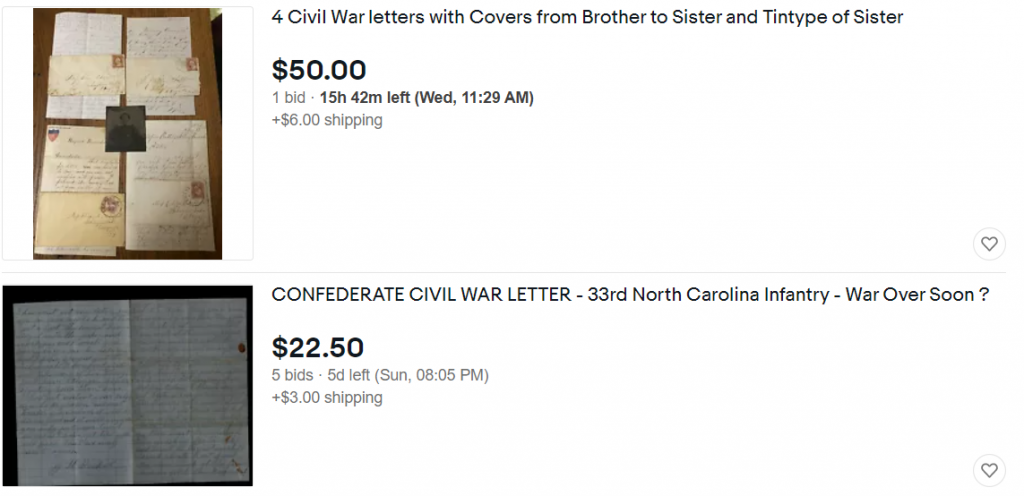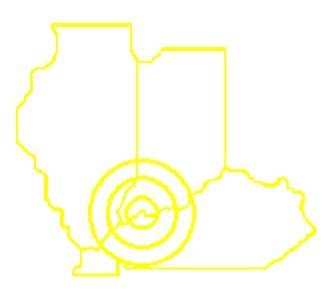
In my last few Kassidy’s Corner posts, I’ve shared the definition of primary documents and even posted the Civil War letters housed in my personal archives. If you’ve discovered how important primary documents are, and you’ve decided you’d like to own a unique and authentic piece of history, then keep reading! Here, I’ll explain how you can collect primary documents and even mention some tips on how to make sure you aren’t purchasing a forgery.


Antique Shop ‘Till You Drop!
Antique shops are a great place to discover your next historical treasure! While I haven’t stumbled across many antique shops that hold primary documents, it isn’t impossible to find a historical letter, newspaper, diary, or more at antique stores across the nation. Consider heading to your local antique shop to check out what merchandise they have. Even if you don’t walk away with a primary document, who knows what other cool items you may find?
Tip: Consider calling antique shops ahead of your trip to see what merchandise they have available. To keep your search extra tidy, make a list of nearby antique shops and include their phone number. Then, call each business and make note of which ones do–or don’t–have primary documents for sale. This will save you driving time (and gas money!), since you won’t have to head to shops that don’t have the items you’re looking for.


Bid Online!
If you’re looking to buy a primary document (particularly letters) at a bargain, consider heading to ebay! Ebay offers a “buy it now” option where you can purchase primary documents without the fear that you might not be able to snag the relic, though buyers should note that this approach is often more costly. However, if you bid on letters through ebay, you might find that you can purchase letters at a rate that’s more cost effective. In fact, through bidding, I’ve been able to purchase a few Civil War letters at under $50. Score!
Tip: If you’re bidding, it’s easy to get caught away and potentially blow your budget. Before the bid ends, consider what your maximum budget is and don’t bid an amount that you’re not willing to pay. Knowing your budget will ensure you don’t break your bank and will keep some of the bidding stress at bay.


Buy Online!
If you don’t find a primary document on ebay, take heart! There are plenty of other online primary document sellers to choose from. Simply start by looking up key words for your search, like “World War I letters,” “Civil War newspapers,” etc., and see what returns your search yields. You should have several relic sites pop up in your search browser so you can begin shopping.
Tip: Check out a seller’s reviews before committing to buying an item. If the reviews are negative, it might be best to avoid that seller and find primary documents elsewhere. Always make sure you’re buying from a reputable business!


Collect Newspapers!
Newspapers are an interesting aspect of primary documents, containing news stories that were once read by people who lived through historic events. Luckily, Timothy Hughes Rare & Early Newspapers lets buyers purchase these historic pieces to add to their own collection. Even better, Timothy Hughes offers newspapers from an array of eras, dating from the 1600s all the way up to the 2000s (and virtually every era in-between). If you haven’t found a newspaper you can’t live without, you can still purchase protective folders and cases on Timothy Hughes to make sure your artifacts are properly stored.
Tip: Timothy Hughes offers authentic newspapers at prices that, for primary documents, are a true bargain. I even spotted an 1861 newspaper priced at just under $30! If you’re looking to save more money, you can also sometimes buy newspapers that are in rougher condition. Or consider buying wholesale lots to save funds in the long run.


Now that we’ve looked at ways you can add primary documents to your collection, let’s explore ways that you can make sure you aren’t adding a forgery to your collection.
- Look Up Their Name – If you’re buying a letter written by a United States servicemember or civilian, look up the individual on Fold3, Ancestry, or other genealogy sites to make sure the person actually existed. If they were in the military, check out their regiment’s service history. If the letter is dated for June 13, 1862, from Murfreesboro, Tennessee, but the soldier’s unit was actually stationed in Virginia at that time, it’s possible that the letter is a forgery. If you can’t verify that the letter’s writer actually existed, or you have doubts about the letter’s authenticity, it’s often best to avoid buying the piece. Note: I also like to look up the camp that Civil War soldier’s wrote from to make sure they existed. However, many of these army camps were small and not well documented. Therefore, even if you can’t trace an army camp, this doesn’t necessarily indicate that the letter isn’t authentic. Use your best judgement, and do lots of research, before purchasing a letter!
- Don’t Get Caught Up in the Moment – When you find a letter you can’t live without online (and the bid ends in, like, 5 minutes) or you stumbled across a prized primary document at an antique store, you probably don’t have time to thoroughly research the item before making a decision about whether you buy the document or not. In these instances, you may choose to purchase the item and do the research later. If this happens to you, though, makes sure the seller offers a return period. Or, if it’s an antique shop, consider asking if they’ll reserve the item for you while you conduct research. It’s always best to not get caught up in the moment! Note: I check sites that sell primary documents often to make sure I have plenty of time to research a letter I’m interested in before someone else snatches up the item. This way, I can authenticate the item with ample time available.
- Review It – Like I already mentioned briefly, check out a seller’s online reviews before you commit to buying an item they have for sale. If the seller has poor reviews (especially if buyers note that the documents seem like forgeries), it’s probably best to steer clear. Note: I always read the seller’s response to negative reviews about their products. If the seller seems like a bully or degrades the reviewer, I shop somewhere else. To me, buying from a seller who has positive reviews and offers a return period is vital.
- If It’s Too Good to Be True – We’ve all heard the phrase, “If it’s too good to be true, it probably is.” While the adage is true for basically every life situation, I’ve often found it to be correct in regards to artifact collecting. Once, I found a letter at a pretty good bargain that was written by a “soldier” who was stationed just 30 minutes away from my house. However, after doing some research at various sites, I could never verify the soldier existed. Because of that, I didn’t purchase the letter even though it would have been a coveted piece in my collection. Since it seemed too good a find, I realized it might have been a forgery. Like folks say, better safe than sorry! Note: Use your best judgement when purchasing primary documents. While you might not be able to find a trace of every primary document writer, I always find it important to verify each letter. Whether you’re new to letter collecting or you’re a seasoned collector, it’s a good habit to start!
- Authenticate It – Still unsure if your primary documents are real or forgeries? Consider getting them authenticated by a professional, reputable third-party authentication service. While many online sellers say their pieces come with a certificate of authentication (COA), oftentimes the sellers themselves back the items with their own business’s COA. In other words, seller’s simply print a piece of paper stating that the item is authentic. To make sure the primary document is real, it’s important to use a third-party business that is disinterested in the artifact’s authenticity. Note: Be sure to check out reviews of authentication services. It’s always a good idea to choose a company that’s trusted in the historical field.

Thanks for joining me over these last few posts as I’ve explored primary documents. Even if you’re not interested in adding primary documents to your collection, hopefully you’ve recognized their importance to historians and genealogists alike. They certainly lend an unparalleled perspective to the study of the past and for researchers prove invaluable.
Happy collecting!

*DISCLAIMER: The links shared throughout this post are not endorsed by TSGS and are only meant to provide collectors with helpful website links. Additionally, the tips provided in no way guarantee that you can verify the authenticity of each artifact, but rather provide information on how you can attempt to avoid forgeries.


